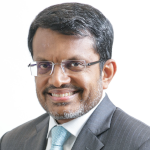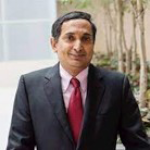Thursday, Oct 13, 2022 | 10:00 AM - 10:30 AM
Location: Cedar Hall, HQ1-1-660

 |
Ravi Menon Managing Director of the Monetary Authority of Singapore |
Mr Ravi Menon was appointed Managing Director of the Monetary Authority of Singapore (MAS) in 2011. He was previously Permanent Secretary at the Ministry of Trade & Industry (MTI) and Deputy Secretary at the Ministry of Finance (MOF). Mr Menon began his career at MAS in 1987. During his 16 years in MAS, he was involved in monetary policy; econometric forecasting; organisational development; banking regulation and liberalisation; and integrated supervision of complex financial institutions. Mr Menon spent a year at the Bank for International Settlements in Basel, as a member of the secretariat to the Financial Stability Forum. A recipient of the Singapore Government's Meritorious Service Medal and Public Administration (Gold) Medal, Mr Menon has served on a variety of boards in the public, private, and people sectors in Singapore. On the international front, Mr Menon serves as Chair of the Network of Central Banks and Supervisors for Greening the Financial System as well as Chair of the Glasgow Financial Alliance for Net Zero APAC Network Advisory Board. He is also a member of the Financial Stability Board (FSB) Steering Committee. Mr Menon holds a Master's in Public Administration from Harvard University and a Bachelor of Social Science (Honours) in Economics from the National University of Singapore.
 |
Krishna Srinivasan Director Asia and Pacific Department, IMF
|
Krishna Srinivasan is the Director of the Asia and Pacific Department (APD). In this capacity, he will oversee the institution’s work on all countries in the Asia-Pacific region. He was previously a Deputy Director in APD, overseeing the work on several systemically important countries, including China and Korea. Prior to that, Krishna was a Deputy Director in the Western Hemisphere Department (WHD), where he oversaw the institution’s work on several countries in the Americas, including Brazil, Canada, Mexico, Peru, Ecuador and the island economies of the Caribbean, the department’s research activities, and its flagship product, Regional Economic Outlook (REO) for Latin America and the Caribbean. He is a co-editor of two recent books: Brazil—Boom, Bust and the Road to Recovery; and Unleashing Growth and Strengthening Resilience in the Caribbean. Before joining WHD, Krishna was the IMF’s mission chief for the United Kingdom and Israel, when he was a staff member of the European Department, and before that in the Research Department, where he led the IMF’s work on the G-20 in the context of the global financial crisis. In the context of this work, he and was the editor of an IMF book Global Rebalancing: A Roadmap for Economic Recovery. Krishna has been with the IMF since 1994 and has served in several departments across the institution. He secured his PhD in International Finance from Indiana University and a Master’s from the Delhi School of Economics, India, and has published several papers both at the IMF and in leading academic journals.
Key Points:
Another important aspect is climate transition which will also, at least, in the short run impart inflation as demand of green transition components will increase. E.g. the minerals used in manufacturing of solar panels, batteries will see a rise in inflation. Globally, there has been more awareness about the threats of climate change and the power of finance to influence it. The transition to green economy is not going to happen overnight, it will take time to gradually replace the existing non-green technologies and transition towards more green technologies. An important component to this transition will be the financing or investing in an industrial activity to see how emissions can be reduced (transition finance).
A strong public private partnership is needed to support large scale investment in transition finance from private sources to help the limited public finance. The role of philanthropies will also be important in galvanizing initial funding support for projects and making them feasible.
Quotes:
“The era of cheap money, cheap labor and cheap energy is over.” Ravi Menon
“Climate change is the mother of all supply shocks. What you have seen by way of the pandemic and war, unfortunately they will probably pale beside the effects of climate change on a whole range of supply equations.” Ravi Menon
“Whether you are a country or a company or a financial institution, making a commitment for net zero in 2050 is great but it is not going to stop the emissions now. Let us be clear the emissions are still rising. Let us also be clear global temperatures are still rising… If we proceed on the current trajectory of emissions, temperate are likely to cross 1.5 degrees, not in 2050 but probably in 2030 or 2035 and that means very strong likelihood of catastrophic climate change.” Ravi Menon
I think bringing back a medium to long term orientation in public policy is absolutely critical and today there is too much focus on the short term and the next quarter – that needs to change.” Ravi Menon
Contributor: Zahir Sakhi